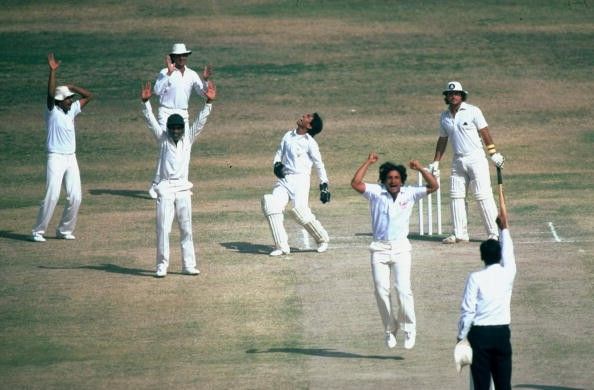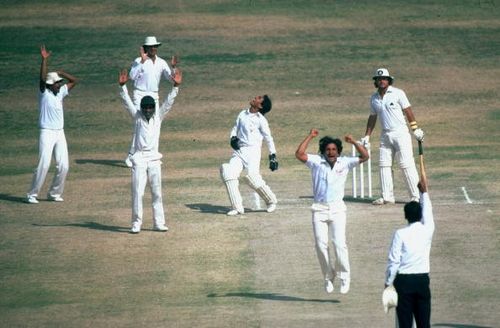
Pakistan vs England - Reliving the thrilling conquest at Karachi

Whenever there is a cricket series between Pakistan and England, the cricketing memories ebb away and a plethora of controversial incidents crop up in our mind. Over the years, the series between the two nations have been heavily affected by various contentious matters which have led to a strained relationship between them.
But despite so many disputes, Pakistan and England have scripted some of cricket’s epic encounters.
The majority of those epic Test matches were contested on English soil while in Pakistan, the story has been more about dull draws and umpiring controversies. Amid those non-cricketing matters and boring draws, however, the men in green do have memories of a few exciting clashes with England on their home soil. One of those is the first Test match at Karachi in 1984 which was a thrilling encounter to say the least.
In 1984, England landed in Pakistan to play a series of three Tests and two ODIs. The English were led by veteran fast bowler Bob Willis under whom the team's performance had been steady if not brilliant. But Willis and his men had just endured a miserable winter by suffering a 1-0 series defeat against New Zealand.
They landed in Pakistan with the determination of bouncing back; at that point of time, England possessed a very good track record against Pakistan. Up until then, England had been unbeaten against Pakistan in 13 home Tests.
The England side boasted players like Ian Botham, Mike Gatting, David Gower, Allan Lamb, Bob Taylor, Vic Marks and Bob Willis whereas the Pakistan team was going through a transition period. It was already devoid of their ultimate weapon and premium all-rounder Imran Khan and batsman Javed Miandad due to injuries, and the team was to be led by Zaheer Abbas.
Young guns like Rameez Raja, Anil Dalpat, Saleem Malik, Azeem Hafeez, Tauseef Ahmed and Qasim Omar were still trying their level best to cement a permanent place in the team. Pakistan’s hopes largely rested on the bowling skills of Abdul Qadir and an aging Sarfraz Nawaz, while Mohsin Khan, Waseem Raja and Zaheer Abbas had the responsibility of countering the bowling of Botham and Willis.
The first Test was played in Karachi. Pakistan included two debutants in their side: wicketkeeper Anil Dalpat, who became the first Hindu to represent Pakistan, and Rameez Raja, younger brother of Waseem Raja. The two became Pakistan’s second set of Test-playing brothers, after the four Mohammads.
The Karachi track was batting friendly, and there were hints of deterioration with the progression of the day. Keeping in mind the weakness of his batsmen against spin bowling, Willis decided to bat first as soon as he won the toss.
England exhibit a composed batting display
Durban-born Christopher Smith, who qualified to play for England by virtue of his English parents, walked out to open the batting with Mike Gatting. Sarfraz Nawaz and Azeem Hafeez took the new ball and generated movement off the fresh pitch which troubled the English openers.
But Smith and Gatting were watchful and patient enough and handled the threat posed by the Pakistani new ball bowlers. The opening pair scripted a prudent 41-run stand. It was more about old-fashioned Test batting rather than the adventurous strokeplay seen in today's game.
Sarfraz and Qadir dent England’s resistance
Abbas was looking for a breakthrough and so he engaged his spinners pretty early. The move worked as Tauseef Ahmed broke the resistance of the openers by castling Mike Gatting. But that dismissal didn’t hamper England’s momentum; with Smith taking root, David Gower carried on and shortly before tea England were 90 for 1.
Both Gower and Smith had handled Abdul Qadir and Tauseef Ahmed with authority, and the English dressing room seemed pleased with the progress of their team.
But then Sarfraz Nawaz made the old ball reverse, a skill which was still a mystery to the cricket world back then, and dismissed Smith and Allan Lamb in successive overs. Sarfraz’s quick dismissals paved the way for Qadir who immediately outclassed Randall with a trademark delivery: the ball spun back at pace to disturb the woodwork.
England finished the first day at 147 for 4.
On the second day, Ian Botham and Gower were expected to bat for a long period and put England in a commanding position. But Qadir and Sarfraz were too hot to handle for the English; they created havoc as the last six wickets fell for just 35 runs. England were all out for 182 runs as Qadir took 5 for 74 while Sarfraz took 4 for 42.
Nick Cook jolts Pakistan batting line-up
The Pakistan openers Mohsin Khan and Qasim Omar started off confidently. Their strokeplay was delightful and they maneuvered the strike to keep the English bowlers at bay.
But Willis then brought on the left-arm orthodox bowler Nick Cook for a breakthrough, and the move paid instant reward. Cook jolted the Pakistani top order and in no time, Pakistan were left reeling at 105 for 5 from 67 for 0.
Mohsin, Qasim, Rameez and Wasim fell victim to Cook’s left-arm spin bowling while Ian Botham was delirious after grabbing the priced scalp of Zaheer Abbas, who had been dismissed for a duck.
Saleem Malik’s fighting knock
Saleem Malik and Anil Dalpat arrested the collapse and hung around to finish the second day at 131 for 5. Willis dismissed Dalpat early on the third day and at 138 for 6, Pakistan were at risk of getting out cheaply as the their tail-enders didn’t have a reputation of giving able support to their batsmen.
But Qadir, who was dropped by Cook while batting on 1, debunked this theory and hung on firmly at the other end to provide steady support to the young Malik.
Malik’s defense and footwork were astute and he gradually built a fort along with Qadir which gave Willis enough headaches. The seventh-wicket pair scripted a 75-run stand under trying circumstances.
Botham broke Malik and Qadir’s defiant stand by dismissing the latter for 40. Malik was dismissed for 74 after helping Pakistan to take a handy lead and Tauseef and Azeem stretched the lead by contributing a valuable 36 runs for the last wicket.
Pakistan finished with a lead of 95 runs in their first innings, and Cook took a six-wicket haul.
England’s meek surrender in the second innings
Sarfraz’s double-strike put England on the back foot in their second innings, but Allan Lamb and Gower steadied the ship as England ended the third day at 54 for 2.
England’s batting on the fourth day, however, was a sorry tale. Their hopes of building a solid partnership quickly foundered when Lamb was the victim of one of three controversial decisions in the innings. Qadir flummoxed Randall with another googly for the second time in the Test match, Tauseef had Botham’s leg-stump flattened as he went for a sweep, and Marks, bowled between bat and pad by a Safraz in-cutter, followed before lunch.
And when Gower, in the first over afterwards, edged a cut to slip, England were 128 for seven.
They were leading by just 33 runs and Bob Taylor, who could bat when needed, was expected to marshal the tail and add some valuable runs. But the Pakistani bowlers were in no mood to lose their grip on the match. Taylor, Cook and Willis were dismissed cheaply as Pakistan needed just 65 runs to win the first Test.
A thrilling finish
The Test match became a part of cricketing folklore and attracted attention from everywhere when Pakistan started their chase. Cook, who was having the Test match of his life, dismissed Qasim, Mohsin and Zaheer quickly as Pakistan were reduced to 26 for 3.
Panic set in the Pakistani batting order as Malik was run out after he refused to accept the rejection of a single, and when Rameez and Wasim were out caught in the following two overs, Pakistan were sinking at 40 for 6.
England should thank Ian Botham for his brilliant slip catching off the fast-traveling edged drives and Norman Cowan’s breathtaking catch in the outfield inches inside the boundary to dismiss Wasim Raja for their dramatic turnaround.
As England edged closer towards a memorable victory Pakistan were desperately seeking calm nerves, and Anil Dalpat provided them composure under such tense circumstances. Qadir’s bat proved valuable again for Pakistan as he gave Anil some much-needed support.
The two stitched a 19-run partnership for the seventh wicket. Cook dismissed Qadir and at 59 for 7, the game was on a knife’s edge. Pakistan’s unbeaten record at Karachi was at stake while it seemed that England would maintain their unbeaten record against Pakistan on their home soil.
It was a nail-biting situation as Pakistan kept taking nervy singles by beating the alert English fielders amid enormous pressure. With three runs required to seal the victory, Sarfraz edged a boundary to hit the winning runs 25 minutes from the close of the fourth day. It was Pakistan's first victory over England in 13 home Tests.
This Test match at Karachi is hardly talked about these days when people discuss Pakistan and England Test matches. They debate more about the controversies, but always forget those nerve-jangling encounters.
Almost 31 years ago, Karachi witnessed a battle of nerves which has almost disappeared from the memories of cricket fans. Within a few days, England and Pakistan will take part in another Test series. Let's hope this series will be free of controversies and gift us more such memorable encounters.